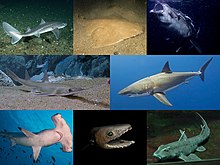ସାର୍କ
ସାର୍କ (ଇଂରାଜୀ ଭାଷାରେ Sharks) ଏକ ପ୍ରକାର (elasmobranch ) ମାଛ ଦଳକୁ ବୁଝାଏ ଯାହାର ଉପାସ୍ଥିରେ ଗଢ଼ା କଙ୍କାଳ (cartilaginous skeleton) ଥାଏ, ୫-୭ ଗାଲିସି ଫାଙ୍କ (gill slits) ଉଭୟ ପାଖ ମଥାରେ ଥାଏ ଓ ମୁଣ୍ଡ ସହ ସଂଯୁକ୍ତ ହୋଇନଥିବା ପେକ୍ଟୋରାଲ ଫିନ (pectoral fins) ଥାଏ । ଅଧୁନା ସାର୍କମାମନଙ୍କୁ କ୍ଲେଡ (clade) ସେଲାସିମର୍ଫ ଓ ଭଗିନୀ ଦଳକୁ (sister group) ବାଟଏଡିଆ (rays), ଏହି ଦୁଇ ଦଳରେ ବିଭକ୍ତ କରାଯାଉଛି । ଏହି ବ୍ୟାପକ ସଂଜ୍ଞା ଅନୁସାରେ ୪୨୦ ବର୍ସ ପୂର୍ବେ ଥିବା ସାର୍କ ଦିଆଗଲା [୨] ଆକାନ୍ଥୋଡିଆନ (Acanthodian) ସାର୍କମାନଙ୍କୁ ସ୍ପିନି ସାର୍କ ମଧ୍ୟ କୁହାଯାଏ; ସେମାନେ କଣ୍ଡ୍ରିକଥେସ ନ ହୋଇଥିଲେ ମଧ୍ୟ ପାରାଫାଇଲେଟକ ହୋଇଥିବା ଯୋଗୁ ଉପାସ୍ଥି ମାଛ ଦଳରେ ଥାଆନ୍ତି । ସେଇଦିନୁ ୫୦୦ ଜାତିରେ ଏକ ଚିଠାରେ ନାମ ଅଛି । ସେମାନେ ୧୭ ସେ:ମି: ଲମ୍ବ ବିଶିଷ୍ଟ ବାମନ ଲାଣ୍ଟନସାର୍କରୁ (en:dwarf lanternshark) ଆରମ୍ଭ କରି ୧୨ ମିଟର ବିଶିଷ୍ଟ ତିମି ସାର୍କ (whale shark) ପର୍ଯ୍ୟନ୍ତ ପୃଥିବୀର ସବୁଠାରୁ ବଡ଼ ଆକାର ବିଶିଷ୍ଟ ମାଛ ଭାବରେ ପରିଗଣିତ ହୋଇଥାଆନ୍ତି । [୩] ସାର୍କମାନେ ସମସ୍ତ ସମୁଦ୍ରରେ ୨୦୦୦ ମିଟର ତଳେ ଦେଖାଯାଆନ୍ତି । ବୁଲ ସାର୍କ ଓ ରିଭର ସାର୍କ ବ୍ୟତୀତ ବ୍ୟତୀତ ଅନ୍ୟ ସମସ୍ତେ ସାଧାରଣତଃ ସାଧାରଣତଃ ସଜ ଜଳରେ ବାସ କରନ୍ତି ନାହିଁ । [୪] ସାର୍କମାନଙ୍କର ଚର୍ମକୁ ସୁରକ୍ଷା ଦେବାକୁ ଏକ ଡର୍ମାଲ କ୍ୟୁଟିକ୍ଲ ଘୋଡ଼ଣୀ ଥାଏ ଯାହା ପରଜୀବୀ ଆକ୍ରମଣରୁ ମଧ୍ୟ ରକ୍ଷା କରେ ଓ ଫ୍ଲୁଇଡ ଡାଇନାମିକ୍ସକୁ (fluid dynamics) ଉନ୍ନତ କରେ । ସେମାନଙ୍କର ଅନେଇ ବଦଳକ୍ଷମ ଦାନ୍ତ ସେଟ୍ ଥାଏ ।[୫]
| colspan=2 style="text-align: center; background-color: transparent; text-align:center; border: 1px solid red;" | Sharks | |
|---|---|

| |
| Clockwise from top left: en.spiny dogfish, Japanese sawshark, whale shark, great white shark, horn shark, frilled shark, en:scalloped hammerhead and en:Australian angelshark representing the orders Squaliformes, Pristiophoriformes, Orectolobiformes, Lamniformes, Heterodontiformes, Hexanchiformes, Carcharhiniformes and Squatiniformes respectively. | |
| colspan=2 style="min-width:15em; text-align: center; background-color: transparent; text-align:center; border: 1px solid red;" | ବିଜ୍ଞାନଭିତ୍ତିକ ଶ୍ରେଣୀବିଭାଗ | |
| colspan=2 style="text-align: center; background-color: transparent; text-align:center; border: 1px solid red;" | Orders | |
|
Carcharhiniformes | |
| colspan=2 style="text-align: center; background-color: transparent; text-align:center; border: 1px solid red;" | Synonyms | |
| |
ଜଣାଶୁଣା ପ୍ରଜାତିର ସାର୍କମାନଙ୍କ ନାମ ଟାଇଗର ସାର୍କ, ବ୍ଲୁ ସାର୍କ , ଗ୍ରେଟ ହ୍ୱାଇଟ ସାର୍କ , ଇସୁରୁସ ସାର୍କ , ଥ୍ରେସର ସାର୍କ ଓ ହ୍ୟାମରହେଡ ସାର୍କ ଗୁଡ଼ିକ ଜଳ ମଧ୍ୟରେ ସର୍ବାଧିକ ଖାଦ୍ୟ ସଂଗ୍ରହକାରୀ ଶିକାରୀରୂପେ ପରିଗଣିତ । ମାନବ ମଧ୍ୟ ଅନେକ ସାର୍କ ମାଛମାନଙ୍କୁ ମାରିବାଦ୍ୱାର ତାଙ୍କ ବଂଶ ଲୋପ ପାଇଯାଉଛି ।
ପ୍ରଜନନ
ସମ୍ପାଦନାସାର୍କ ମାଛ ଅଳ୍ପ ସଂଖ୍ୟକ ପୂର୍ଣ୍ଣ ବିକଶିତ ଛୁଆ ସୃଷ୍ଟି କରନ୍ତି, ଅନ୍ୟମାନଙ୍କ ଭଳି ଅବିକଶିତ ଛୁଆ ଜନ୍ମ କରନ୍ତିନି । ସାର୍କମାନେ ପ୍ରତି ପ୍ରଜନନ ଚକ୍ରରେ ୨-୧୦୦ ଛୁଆ କରନ୍ତି ।[୬] ଅନ୍ୟ ମାଛ ଅପେକ୍ଷା ସାର୍କମାନଙ୍କର ଶରୀର ବିକାଶ ବହୁତ ଧୀରେ ହୁଏ । ଲେମନ ସାର୍କ ୧୩-୧୫ ବର୍ଷରେ ପୂର୍ଣ୍ଣାଙ୍ଗ ପ୍ରାପ୍ତ ହୁଏ ।[୭]
ଯୌନ
ସମ୍ପାଦନାବୃଷଣ (internal fertilization) ପଦ୍ଧତିରେ ସାର୍କ ଛୁଆ ଜନ୍ମ କରନ୍ତି ।[୮] ଅଣ୍ଡିରା ସାର୍କର ପେଲଭିକ ଫିନର ପୃସ୍ଠ ଭାଗ ପରିବର୍ତ୍ତିତ ହୋଇ ଏକ ଯୋଡ଼ା କ୍ଲାସ୍ପରରେ ପରିଣତ ହୁଏ ଯାହା ଲିଙ୍ଗର କାମ କରେ ଓ ତାହା ମାଧ୍ୟମରେ ମାଈ ସାର୍କ ଭିତରକୁ ଶୁକ୍ରକୀଟ (sperm) ଛାଡ଼ିଦିଏ । [୯]
ଯୌନ ସଙ୍ଗମ କ୍ୱଚିତ ହେଉଥିବା ଦେଖାଯାଏ । [୧୦] ଛୋଟ କ୍ୟାଟସାର୍କ ଅଣ୍ଡିରା ସାର୍କ ଚାରିପାଖରେ ଗୁଡ଼େଇ ହୋଇ ଯୌନ ସଙ୍ଗମ କରେ । କେତେକ ସାର୍କ ସମାନ୍ତରାଳ ହୋଇ ରହିବା ପରେ ଅଣ୍ଡିରାର କ୍ଲାସ୍ପର ମାଈର ଓଭିଡକ୍ଟ ଭିତରକୁ ଭର୍ତ୍ତି କରି ଦୁଇ ସାର୍କ ସଙ୍ଗମ କରନ୍ତି । ଯୌନ ଉତ୍ତେଜନାରେ ମାଈ ସାର୍କ କାମୁଡ଼ା ଖାଇବା ମଧ୍ୟ ଦେଖାଯାଏ ଓ ସେଥି ଯୋଗୁ ମାଈ ସାର୍କର ଚମଡ଼ା ମୋଟା ଥାଏ । [୯]
ଅଲଙ୍ଗୈକ
ସମ୍ପାଦନାକେତେକ କ୍ଷେତ୍ରରେ ସଙ୍ଗମ ନହୋଇ ଛୁଆ ଜନ୍ମ (parthenogenesis) ହେବା ମଧ୍ୟ ଦେଖାଯାଇଛି । [୧୧][୧୨]
ଆଧାର
ସମ୍ପାଦନା- ↑ "Selachii (shark)". The Paleontological Database (PBDB). Archived from the original on 2018-07-10. Retrieved 2018-07-10.
- ↑ Martin, R. Aidan. "Geologic Time". ReefQuest. Archived from the original on 2012-01-24. Retrieved 2006-09-09.
- ↑ Pimiento, Catalina; Cantalapiedra, Juan L.; Shimada, Kenshu; Field, Daniel J.; Smaers, Jeroen B. (24 January 2019). "Evolutionary pathways toward gigantism in sharks and rays". Evolution. 73 (2): 588–599. doi:10.1111/evo.13680. PMID 30675721.
- ↑ Allen, Thomas B. (1999). The Shark Almanac. New York: The Lyons Press. ISBN 978-1-55821-582-5. OCLC 39627633.
- ↑ Budker, Paul (1971). The Life of Sharks. London: Weidenfeld and Nicolson. SBN 297003070.
- ↑ Leonard J. V. Compagno (1984). Sharks of the World: An annotated and illustrated catalogue of shark species known to date. Food and Agriculture Organization of the United Nations. ISBN 978-92-5-104543-5. OCLC 156157504.
- ↑ Gruber, Samuel H. (February 21, 2000). "LIFE STYLE OF SHARKS". Archived from the original on July 27, 2011. Retrieved June 20, 2010.
- ↑ Adams, Kye R.; Fetterplace, Lachlan C.; Davis, Andrew R.; Taylor, Matthew D.; Knott, Nathan A. (January 2018). "Sharks, rays and abortion: The prevalence of capture-induced parturition in elasmobranchs". Biological Conservation. 217: 11–27. doi:10.1016/j.biocon.2017.10.010. Archived from the original on 2019-02-23. Retrieved 2018-11-24.
- ↑ ଏହି ଯାଏ ଉପରକୁ ଯାଆନ୍ତୁ: ୯.୦ ୯.୧ Martin, R. Aidan. "Why Do Sharks Have Two Penises?". ReefQuest Centre for Shark Research. Archived from the original on 2009-08-28. Retrieved 2009-08-22.
- ↑ "How Do Sharks Mate? - Center For Ocean Life". Center For Ocean Life. Archived from the original on 2018-09-06. Retrieved 2018-09-09.
- ↑ Chapman DD; Shivji MS; Louis E; Sommer J; Fletcher H; Prodöhl PA (2007). "Virgin birth in a hammerhead shark". Biology Letters. 3 (4): 425–7. doi:10.1098/rsbl.2007.0189. PMC 2390672. PMID 17519185.
- ↑ In shark tank, an asexual birth Archived 2009-07-09 at the Wayback Machine., Boston Globe, 10 Oct. 2008